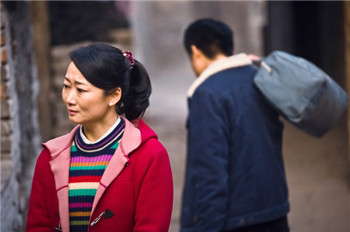(单词翻译:单击)

Three times in “Mountains May Depart,” the latest from the transformative Chinese director Jia Zhangke, people stand near a river that weaves through the landscape like a snake. In the first instance, three friends light fireworks that send out modest sparks. In the second, only two return to the river, where they ignite a bundle of dynamite. By the third trip, only one of the original three remains, everyone’s life having changed as profoundly as China, a cataclysm that’s expressed by a series of rapid explosions in the river, suggesting a drowning world.
《山河故人》是革命性中国导演贾樟柯的新作,剧中出现了三次人们站在一条如长蛇般蜿蜒而过的河流旁边的情景。在第一幕戏里,三个朋友放起了烟火,不大不小的火花升起来。在第二幕里,只有两个人回到河边,点起了一捆炸药。到了第三次,三人中只剩下一个人了。每个人的生活都经历了和中国一样深刻复杂的变化,河上一连串快速的爆炸展现出一场灾难,暗示着一个被淹没的世界。
Few filmmakers working today look as deeply at the changing world as Mr. Jia does, or make the human stakes as vivid. The three sending out those sparks are Tao (Zhao Tao), and her two close male friends, Zhang Jinsheng (Zhang Yi) and Liangzi (Liang Jin Dong). An affable, easygoing drifter with an expansive smile, Tao works in a small store in the city of Fenyang (Mr. Jia’s birthplace). Mr. Jia likes a slow reveal and it isn’t initially obvious that Tao is the movie’s emotional organizing principle whose feelings run, surge and erupt. The story tracks Tao and her relations with both Liangzi, who works at a coal mine, and Jinsheng, a budding entrepreneur.
如今尚在工作的导演之中,很少有人能像贾樟柯这样深入地审视变化中的世界,或是鲜明地呈现人类的处境。三个燃放烟花的人是涛(赵涛饰)和她的两个男性好友,张晋生(张译饰)和梁子(梁景东饰)。涛是个善良随和、笑容开朗的女孩,在汾阳市一家小商店工作(这里也是贾樟柯的故乡)。贾樟柯喜欢把故事慢慢呈现出来,所以一开始不能清晰地看出,涛的情感的持续、汹涌与爆发其实是影片的感情线索。影片讲述了她本人的故事,以及她与矿工梁子和新型企业家晋生之间的爱情故事。
Eventually, Tao chooses one man over the other, a decision that fractures the trio and sends the narrative spiraling in different directions. Mr. Jia’s approach means that you have to do a certain amount of interpretive work, though mostly you just have to pay attention and be a little patient. If you do, you will notice that “Mountains May Depart” is a movie of threes: its main characters, moments in time, narrative sections, historical symbols and even aspect ratio come in triplicate. This schematic quality isn’t necessarily obvious on first viewing, even though the story’s time frames — 1999, 2014 and 2025 — are announced on-screen and accompanied by a corresponding increase in the size of the image, an enlargement that mirrors the character’s expanding universe.
最后,涛选择了其中一人,打破了三角关系,令叙事向着不同方向发展。贾樟柯的方式意味着观众必须自行做出一定程度的解读,尽管多数情况下,观众只需专心观看并保持一点耐心就好了。如果你能做到,就会注意到《山河故人》其实是一部关于“三”的电影:三个角色、三个时间点、三个叙事单元、三个历史符号、甚至还有三种画面比例。第一次观影时,这种特质不一定明显,不过,故事发生的三个时间点——1999、2014和2025年——都被标明在银幕上,并随着画幅的增大而增大,这种扩大也反映出片中角色的世界在扩张。
When the movie opens in 1999, for instance, Tao is right in middle of the action (and the frame), dancing with a large group to the Pet Shop Boys’ dementedly catchy 1993 cover of “Go West,” an old Village People tune. The original music video for the Pet Shop Boys’ version, an exuberantly surreal pageant, includes shots of Red Square and Vladimir Lenin. Mr. Jia doesn’t reference the video, but it’s likely he used the cover partly because of its post-Soviet bloc resonance. Whatever the case, it’s a lovely, festive scene that suggests that everyone is in a party (or Party) mood. When Tao and the others form a conga line it seems as if they have decided to take the song literally.
比如,在影片一开始的1999年,镜头正中,涛和一大群人一起跟着《向西》(Go West)的迷人音乐跳舞,这首歌是“宠物店男孩”(Pet Shop Boys)1993年翻唱“村民”(Village People)乐队的老歌。“宠物店男孩”的音乐录像充满超现实主义的华丽场景,其中有红场和列宁的镜头。贾樟柯并没有影射那段录像,他使用这个版本只是因为它带有后苏联阵营的感觉。不管怎么说,这是一个美好的节日场景,表现出每个人都处在派对(或者党)的欢快情绪中。后来涛和其他人挑起了康加舞,好像他们真的要像歌词里唱的那样一起前行。
Mr. Jia never over-explains his work. The dance feels triumphant, at once choreographed and spontaneous, but there’s no immediate reason for it, even when the date 1999 appears on-screen. It isn’t until the next scene, when Tao is trading New Year’s greetings, that the dance feels tethered to a rationale. By that point, though, you will have had time to think about the dance, to turn it around in your head, consider its possibilities and wonder whether the revelers are spontaneously dancing or celebrating the end of the millennium or the 50th anniversary of the People’s Republic. Or perhaps the scene has more to do with Tao, a woman who smiles and who dances.
贾樟柯从不过度解释自己的作品。那场舞蹈像是一种胜利,既像是精心编排的,也像是自发的,虽然“1999”字样在银幕上出现,也不能看出人们跳舞的直接原因。直到下一幕涛和他人互相拜年的时候,这场舞蹈才最终有了合理性。不过,到了这个时候,你就有了时间去思考这次舞蹈,在头脑中回味它,考虑它的可能性,好奇这些狂欢者们究竟是在自发的舞蹈,抑或是庆祝千禧年的结束,又或是庆贺共和国成立50周年。又或者这一幕其实只和涛,这个面带微笑,翩翩起舞的女人有关。
Ambiguity is a defining characteristic of the European art cinema; at its most clichéd, directorial solipsism is mistaken for mystery and empty images are turned into endlessly masticated cud for cultists. Although Mr. Jia is obviously conversant with the European art film — and East Asian cinema and Hollywood and so forth — he has carved out his own ways of making cinematic meaning, an approach that draws on different idioms and traditions. He occasionally folds an image into the mix that can feel enigmatic, but that over time make sense when considered in the context of the movie as a whole. A shot of an old-fashioned pagoda may not make ready sense, may even look like picture-postcard scenery, yet by the end of the movie it may make you weep.
模糊性是欧洲艺术电影的关键特征,在其最俗套的时刻,导演的唯我独尊被误解为神秘,空洞的画面反而成了小众拥趸们不断反刍的粮食。尽管贾樟柯显然熟悉欧洲艺术电影——当然也熟悉东亚电影与好莱坞电影等等——他开创自己表达影像意义的方式,与传统和俗套都不尽相同。他偶尔会在影片中混入一幅谜一般的画面,但随着时间过去,就会在影片的整体语境中呈现出意义。一个老式宣传口号的镜头乍看上去可能没什么意义,甚至看上去有点像明信片上的风景,但是到了影片最后,它可能会让你潸然泪下。
Mr. Jia has characterized “Mountains May Depart” as his most emotional movie, which may underplay how deeply moving his work can be. While he invariably addresses larger cultural, social and political issues, sometimes openly, at other times obliquely, what makes his work memorable is how those larger forces are etched in the faces and bodies of his characters, in the coal dust that defines one man’s reality — and, by extension, one China — and the hard mask that defines another truth, another China. Here, when Tao first walks down a street flanked by modest brick buildings, she is moving through a country that is rapidly being lost to what’s optimistically called development. By the end, she is living in a new world even if, Mr. Jia suggests, her soul remains in the old.
贾樟柯说《山河故人》是自己最富情感的影片,他可能低估了自己的作品有多么深切感人。虽然他总在讲述较大的文化、社会与政治问题,有时是公开的,有时是隐晦的,但是他的作品最令人难忘的,还要算是这些大的力量如何在片中人物的面孔与身体上蚀刻印记:煤矿的粉尘呈现出片中那个男人的真实处境,乃至整个中国的真实处境,他那坚实的面具则呈现出另一种真相与另一个中国。片中,涛第一次走上两边都是低矮砖房的街道时,她走过的是一个正在乐观者所谓的“发展”中迅速迷失的国家。而到影片结束时,虽然她生活在一个崭新的世界,但正如贾樟柯所暗示的,她的灵魂还留在旧世界之中。
“Mountains May Depart” is unrated and is in Cantonese, Mandarin and English. Running time: 2 hours, 11 minutes.
《山河故人》未分级,粤语、普通话与英语对白。2小时11分钟。


